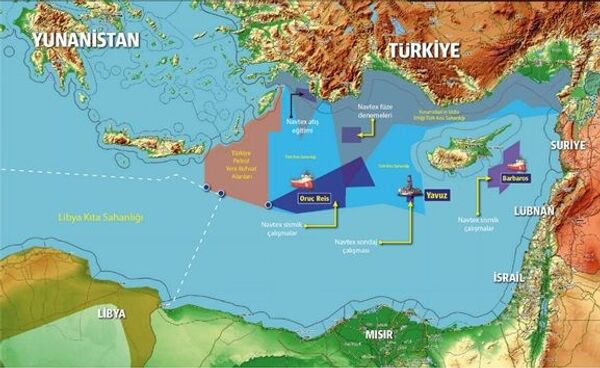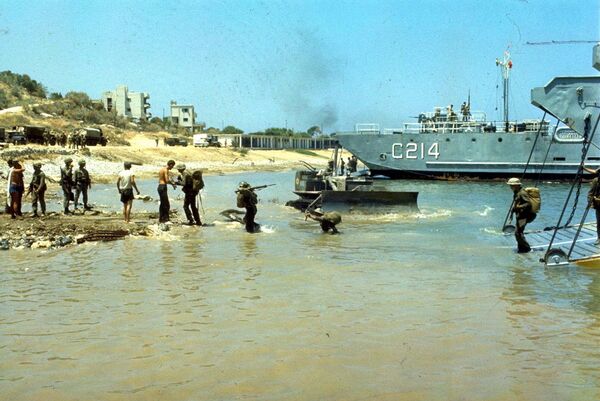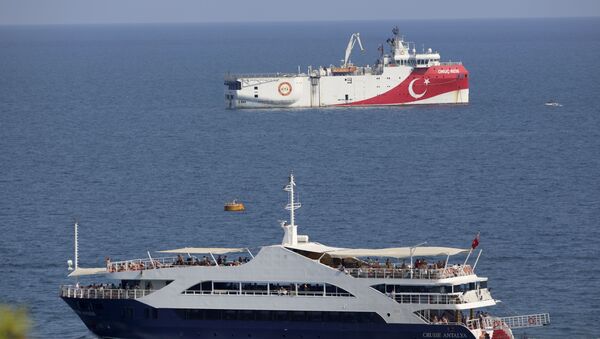Turkey has vowed to send a reconnaissance vessel, the Oruç Reis, back to disputed waters in the eastern Mediterranean after it undergoes routine maintenance.
The announcement, on Monday 14 September, suggests President Recep Tayyip Erdogan is in no mood to back down in the wake of Greece’s declaration on Sunday that it would buy 18 Rafale jet fighters from France.
The two countries have been rattling sabres for several weeks as tensions rise over the exploitation of hydrocarbons in the eastern Mediterranean and especially near the island of Cyprus.
— PanEuropeanMovement (@EuropeanPan) September 14, 2020
The Greek Prime Minister, Kyriakos Mitsotakis, penned an article in The Times newspaper on Thursday, 10 September, in which he said: “Greece has the military capacity to fend off any Turkish aggression.”
Mr Mitsotakis also warned: "Later this month EU leaders will meet in special session to decide how to respond. If Turkey refuses to see sense by then, I see no option but for my fellow European leaders to impose sanctions. There is still time for Turkey to take a step back."
He called for the Turks to refrain from “naval and scientific activity in non-delineated waters” and for them to “rein in aggressive rhetoric”.
On Sunday the Turkish government confirmed the Oruç Reis had left the contested waters south of Cyprus.
Mr Mitsotakis welcomed it as a "positive first step" but on Monday Turkish Foreign Minister Mevlut Cavusoglu said: “This is routine maintenance and crew replenishment work" and he warned Greece it would be a “mistake” to think Turkey had backed down.
Mr Cavusoglu said: "Greece can perceive it as a step back in the face of our determination. It is suffering the insecurities of a small country."
Last year Greece, Cyprus, Israel, Egypt, Italy, Jordan and the Palestinian Authority formed an East Med Gas forum to draw up a plan to extract and export gas from the region. France is also looking to join but Turkey has been kept out of the club.
Mr Cavusoglu said a map commissioned by the EU and drawn up by the University of Seville was "the cause of all the tension."

He said negotiations could begin if Greece could “forgo the Seville map" and give up its “maximalist” demands.
Greece and Turkey have gone to war twice in the last 100 years and there have been many other “near misses.”
At the end of the First World War, as the Ottoman Empire collapsed following the defeat of Turkey and her ally Germany, Greece sought to take advantage.
Nationalists in Athens dreamed of a Greater Greece which would include millions of ethnic Greeks in western Anatolia.
Dear “Muslim Ummah” brothers:
— حسن سجواني 🇦🇪 Hassan Sajwani (@HSajwanization) September 10, 2020
Remember, Turkey is tarnishing the image and insulting Islam and Muslims by bullying Greece and Cyprus and violating their sovereignty !
Sultan Mehmed VI came under pressure to sign the Treaty of Sèvres, which was even harsher to the Turks than the Treaty of Versailles was on Germany - the Turks would not only lose their whole empire but would also have to give up chunks of the Anatolian heartland.
The treaty proposed granting Greece a large slab of territory around Smyrna (modern day Izmir) but although the sultan signed it in August 1920 Kemal Ataturk rejected it and won massive support among the Turkish military and ordinary people.
— Fahrettin Altun (@fahrettinaltun) September 10, 2020
But King Constantine of Greece and his prime minister Dimtrious Gounaris thought Turkey was vulnerable and weak and, encouraged by British Prime Minister David Lloyd-George, sent troops deep into central Anatolia in the hope of carving out a Greater Greece.
Ataturk showed his military prowess during the Greco-Turkish War and decisively defeated the Greek troops in the summer of 1922.
The Greek army fled Anatolia and tens of thousands of ethnic Greeks - many of whom had lived in Turkey for centuries - went with them.
Turkey stayed out of the Second World War while Greece was occupied by the Germans.
— II. Madrigal (@zugzwangI305) September 7, 2020
A hostile peace remained between Turkey and Greece for 30 years after the war as both governments concentrated largely on domestic issues.

But in 1974 the two countries went to war again, this time over Cyprus.
The colonels who had ruled Greece since 1967 fomented a Greek nationalist coup on the island with the idea of uniting Cyprus and Greece in what was known as “enosis”.
The coup triggered fears for the Turkish Cypriot minority because one of the leaders, Nikos Sampson, had threatened to wipe them out.
The Turkish army invaded northern Cyprus and conquered a large swathe of territory, which became a safe zone for Turkish Cypriots.
A UN peacekeeping force arrived to keep the peace but the Turkish troops never left the island and Ankara encouraged the creation of the Turkish Republic of Northern Cyprus, although it has not gained diplomatic recognition by anyone other than Ankara.
— Prof. Steve Hanke (@steve_hanke) September 12, 2020
But UN Secretary General Kofi Annan’s reunification deal was rejected by the Greek Cypriots in 2004 and the island went back in the diplomatic deep freeze.
Cyprus was allowed to join the EU that same year and Turkey believes the bloc is biased against it because of the presence of both Greece and Cyprus.
Greece has responded to the presence of the Oruç Reis by staging naval drills with France and other EU allies.
The Turkish-Greek conflict was top of the agenda at the Med7 group summit in Corsica on Friday, 11 September, and will be discussed again on 23 September at the EU council meeting.
Germany - which has a large ethnic Turkish migrant population and tries to maintain good relations with Ankara - is reportedly trying to mediate a solution but neither side are in the mood to lose face.
US Secretary of State Mike Pompeo visited Cyprus on Sunday and said Washington was "deeply concerned" by Turkey’s actions "in areas over which Greece and Cyprus assert jurisdiction."




